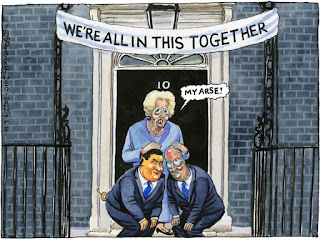
Writing in the Sunday Telegraph on Sunday 20 June, David Cameron said the public should express its appreciation of Britain's military "more loudly and more proudly" Our union is in full agreement with this statement. However, after today’s budget we have to ask – how can the Tory/Lib Dem coalition, that Mr Cameron heads, achieve a Ministry of Defence that is ‘loud and proud’?
If the civil service is really the fourth arm of the MoD, how can a pay freeze, attacks on our pensions and tens of thousands of job cuts make our department a better place?
Those of us who are left, more than most appreciate the sacrifices our military personnel, particularly on the front line make. We are aware that many of our colleagues serving in the military are paid a pittance for the work that they do and the potential risks that they face. Our union welcomes today’s doubling of the operational allowance. Our military colleagues serving in Iraq, Afghanistan and elsewhere thoroughly deserve this increase.
Our union wants our service personnel properly remunerated and to have the best possible equipment to do the tasks asked of them. To do this, however, we need a fully funded, fully staffed and motivated Ministry of Defence. Today’s budget will give the opposite to all of these.
Pay
The proposal is a 2-year pay freeze for those earning over £21,000 and a flat rate increase of £250 each year for two years for those earning below this. George Osborne announced that inflation would be 2.7% by the end of the year and hitting the government’s 2% target after that. In real terms this is at least a 4.7% pay cut for those earning £21k or above. The lowest paid E2 in the MoD will earn £15,168 when the August 2010 wages are paid - £250 per year equates to approximately 1.6% per year, so in real terms, the lowest paid E2 will lose at least 1.5% over the next two years.
Add to this the increase in VAT to 20%, child benefit frozen for three years, child tax credit withdrawn for families earning over £40k a year and the acceleration of the state pension age to 66, then the cut in real terms for members in the Ministry of Defence will be between 10-15% in each of the next two years.
Pensions
Whilst it was announced over the weekend, that John Hutton, former Labour defence minister would oversee an ‘unbiased’ review into public sector pensions; there can be little doubt from the Chancellor’s claim today that - “The net cost of public service pensions continues to rise, to £10 billion in 2015-16.” – will mean that our pensions are clearly threatened.
Although Mr Osborne continually tried to claim that the richest will pay the most after this budget there was no mention when talking about public sector pensions about the fact that two and a half times as much public sector money is spent subsidising private sector pensions through tax relief than paying for public sector pensions – 60% of this goes to earners at the higher rate
MoD jobs
The chancellor ‘kindly’ told us the date when the various government department reviews including the Strategic Defence and Security Review (SDSR) – 20 October 2010. With only education and the NHS apparently ringfenced, all other government departments are now expected to make at least 25% cuts in the next four years.
During the lifetime of the previous Labour government, the number of MoD civilian employees has fallen from 133,300 to 86,600, a 35% fall. Our union’s view is clear that any more cuts to an already cut to the bone will make our department unfit for purpose. Our union will campaign and fight against every single job cut proposal in our department.
Nationally our union is already committed to campaigning against the attacks on public sector pay, pensions and jobs. PCS general secretary Mark Serwotka said:
“The coalition government’s arbitrary timetable to cut the budget deficit is leading to the flawed reasoning that low-paid public servants should pay for a crisis caused by financial speculators. Far from being unaffordable and unsustainable, public sector pay remains low and pensions are modest by comparison with the platinum-plated payouts that senior executives in the private sector continue to award themselves.
In the MoD group, our anti cuts sub committee will meet on Friday 25 June to look not only at how we can support the national campaign, but also to look at how we can campaign on specific MoD issues. If you have any specific ideas on how you think we should campaign on, please email Bob Rollings at
bob@pcs.org.uk.
Chancellor (and multi-millionaire) George Osborne said today that he “rewards work” and “responsible society rewards those who chose to work”. He finished his maiden budget speech by saying that “the richest will pay the most”. Does this mean those earning over £21,000 are now ‘rich’? In a cabinet of 23, as many as 18 (including David Cameron and George Osborne) boast of personal wealth on a scale that MoD members earning £21,000 can only dream of!
There was nothing in the budget from these millionaires about how we would cut the tax gap in the UK. The tax gap is the difference between the amount of revenue that should have, in theory, been collected if all taxpayers paid their correct amount of tax and the total actually received. Reducing the tax gap would mean the new government could avoid having to make swingeing cuts in public services. Our proposals would tackle tax dodging that costs the UK economy £100 billion per year.
Throughout both the national and the MoD campaigns, it is vital we have as much membership support and activism as possible. Our union has shown recently with the victory on the civil service compensation scheme that where we stand together we can win victories.
The Ministry of Defence as we know it is now wholly under threat. Our jobs, our pay, our pension and all of our terms and conditions are now under threat. Please support our union and ensure we have a department to be proud of.
 How to be deaf-aware
How to be deaf-aware 
















